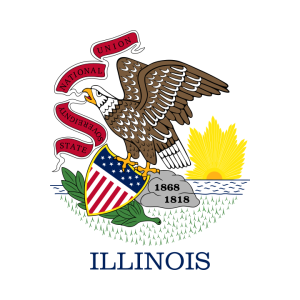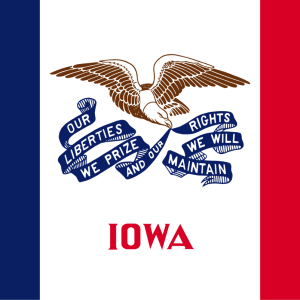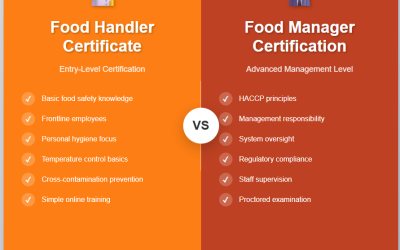In the context of food safety, the American National Standards Institute (ANSI) and its ANSI National Accreditation Board (ANAB) accredit both certificates and certification. These are NOT the same and care should be taken not to confuse these two, or use terms interchangeably. These distinctions are critical for understanding compliance with food safety regulations, such as those outlined in the FDA Food Code and the CFP Standards for Accreditation of Food Protection Manager Certification Programs. Below, I outline the differences and detail the CFP FPMCC standards for food manager certification.
Certificates in Food Safety
A certificate is a document issued to an individual or entity upon successful completion of a specific food safety training program, course, or assessment. According to ANSI, a certificate serves as evidence of achieving a defined learning outcome at a specific point in time. In food safety, certificates are often awarded after completing training on topics such as safe food handling, hygiene, or Hazard Analysis and Critical Control Points (HACCP). For example, a food handler completing a course on food safety basics may receive a certificate of completion. These certificates may be issued by various providers, including non-accredited organizations, and do not necessarily require ongoing oversight or renewal.
- Example: A food handler completing an online course may receive a certificate indicating they have learned basic food safety practices.
- Purpose: Demonstrates completion of a specific educational module or assessment.
- Scope: Limited to the specific training or assessment completed, often without standardized evaluation or third-party oversight.
Certification in Food Safety
Certification is a formal, third-party process where an accredited body verifies that an individual, organization, or product meets predefined standards. Certification is typically aligned with ANSI-accredited programs under standards like ISO/IEC 17024 (for personnel certification) or ISO/IEC 17065 (for products/processes). For food safety, the Conference For Food Protection (CFP) has developed Food Protection Manager Certification Programs (FPMCC), commonly referred to as the “CFP Standards”. These standards ensure that certified food protection managers (CFPMs) demonstrate comprehensive knowledge of food safety practices, such as those in the FDA Food Code. Certification involves rigorous initial assessments, periodic evaluations, and recertification to maintain compliance.
- Example: A food safety manager earning a Certified Food Protection Manager (CFPM) credential through an ANSI-CFP-accredited program undergoes a proctored exam to verify competence.
- Purpose: Validates ongoing competence and compliance with recognized food safety standards.
- Scope: Broad, requiring adherence to national or international standards, with third-party accreditation ensuring credibility.
Key Differences in Food Safety Context
- Scope and Purpose:
- Certificates confirm completion of a specific food safety training or course (e.g., a food handler training module).
- Certification verifies ongoing competence or compliance with standardized food safety requirements, such as those for a CFPM or a GFSI-certified facility.
- Rigour and Accreditation:
- Certificates may be issued by non-accredited providers and focus on education rather than standardized evaluation.
- Certification requires evaluation by an ANSI-accredited body under CFP standards or the ISO/IEC 17024 Standards (with normative document).
- Duration and Maintenance:
- Certificates are static, issued once upon completion, and may have a limited validity period (e.g., a food handler certificate valid for 3 years).
- Certification typically requires recertification every 3–5 years to ensure knowledge aligns with current regulations, such as updates to the FDA Food Code.
- Standards Alignment:
- Certificates may not adhere to specific standards unless issued by an accredited provider.
- Certification is tied to ANSI-CFP standards, ensuring global recognition and compliance with food safety regulations.
CFP FPMCC Standards for Food Protection Manager Certification Programs
The CFP, through its Food Protection Manager Certification Committee (FPMCC), has developed the Standards for Accreditation of Food Protection Manager Certification Programs, which are implemented by ANSI as the accrediting body since 2002. These standards ensure that certification programs for food protection managers are valid, reliable, and legally defensible. Below are the key components of the CFP FPMCC standards, as outlined in CFP documentation and ANSI’s accreditation framework:
- Purpose and Scope:
- The standards apply to all legal entities providing certification for food protection managers, including regulatory authorities and private organizations.
- They aim to ensure that certification programs attest to the competency of food protection managers in protecting public health, aligning with FDA Food Code requirements.
- Accreditation Requirements:
- Certification organizations must be accredited by ANSI under the CFP standards, ensuring compliance with ISO/IEC 17024. This involves submitting documentation to demonstrate adherence to CFP requirements.
- The accreditation process includes evaluation by the ANSI-CFP Accreditation Committee (ACAC), which verifies compliance through initial assessments and ongoing monitoring.
- Examination Standards:
- Certification exams must be psychometrically valid, ensuring fairness, reliability, and equivalence across different exam forms.
- Exams must cover critical food safety topics, including:
- Preventing food contamination.
- Food worker health and hygiene.
- Equipment and utensil safety.
- Managerial responsibilities and regulatory compliance.
- Record-keeping and facility design.
- Exams are typically proctored, consisting of 60–90 multiple-choice questions, with passing scores determined by the certification provider.
- Program Administration:
- Certification organizations must have documented policies and procedures, endorsed by the CFP FPMCC, to ensure impartiality and consistency.
- They must maintain records of certified individuals and provide mechanisms for appeals and complaints.
- Certification Validity and Renewal:
- CFPM credentials are valid for up to 5 years, after which recertification is required through a new accredited exam.
- The FPMCC promotes universal acceptance of certificates issued by accredited certifiers to enhance equivalence across programs.
- Responsibilities of Certifiers:
- Certifiers must ensure that certified managers demonstrate knowledge of food safety practices necessary to prevent foodborne illnesses.
- They are responsible to individuals seeking certification, their employers, and the public, ensuring compliance with local, state, and federal regulations.
- Continuous Improvement:
- The FPMCC works with ANSI to refine standards, develop strategies for equivalence among certificates, and promote universal acceptance of accredited certifications.
- Certifiers must undergo periodic audits to maintain accreditation, ensuring ongoing compliance with CFP standards.
Practical Implications
- Certificates: Often used for entry-level food handlers or non-management staff, certificates are valuable for basic training but may not meet regulatory requirements for management roles. For example, a food handler certificate may suffice for a server but not for a person in charge (PIC).
- Certification: Required in most states for food protection managers or the PIC, particularly in establishments serving time/temperature control for safety (TCS) foods or highly susceptible populations. ANSI-CFP-accredited certifications are widely accepted by health departments.
Sources
- Conference for Food Protection, “Food Protection Manager Certification” (www.foodprotect.org).
- ANSI National Accreditation Board, “Conference for Food Protection (CFP) Accreditation” (anab.ansi.org).
- ISO/IEC 17024:2012, “Conformity assessment – General requirements for bodies operating certification of persons.”
- FDA Food Code (www.fda.gov).
For further details, visit ANSI’s accreditation directory (anab.ansi.org) or the CFP website (foodprotect.org). If you need specific guidance on a state’s requirements or a particular certification program, let me know!
















































